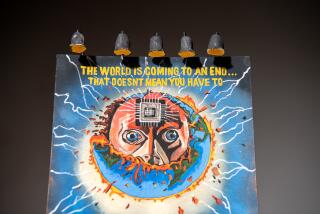Foresight Unseen : Are Distinctions Between Past, Present and Future an Illusion?
- Share via
Someone whose letter I have unfortunately misplaced wrote recently to question my conviction that there is no such thing as “the foreseeable future.”
I had been asked to predict what the world will be like in 2007 and was trying to beg off on the grounds that “I cannot see into the future and I doubt that anyone else can.”
My correspondent suggested an experiment. Supposing someone were to wad up a piece of paper and throw it at me, would I not duck? And would that not suggest that I had foreseen the future? I would know that, unless I ducked, the paper ball would hit me.
That is a very scientific way of approaching the question, and I confess that this reader’s point is persuasive. Indeed, it is possible to foresee that one is about to be hit by a wad of paper.
Ergo , if it is possible to predict the next instant, why not the next year, or decade?
Obviously, certain events are predictable. When a shortstop picks up a ground ball and throws to first, the first baseman puts his glove up exactly where that ball is going to be. He knows it’s going to be there.
That’s what makes baseball such a beautiful game to watch. It is not only the unknown but also the predictable that makes it fascinating. The mechanics of baseball are almost as invariable as Newton’s.
But wait. Is it absolutely certain that the ball will go straight to the first baseman’s glove? It might hit the pitcher. It might hit the runner. It might go into the dirt. What seems predictable is not.
Therefore, except for events that are only a split second away (one is about to be hit by a speeding car), there is, I maintain, no such thing as the foreseeable future.
Of course there are cosmic events that have a foreseeable inevitability. We can predict the orbits of Jupiter and Mars. We know the sun will rise, and at what minute. We can predict the seasons. We can foresee that the tree will grow and die, the river run down to the sea.
But the daily events of our lives remain unforeseeable.
However, there is a great deal going on today in physics and philosophy that I know not of.
One day, two or three years ago, I walked into the office of my friend Herb Henrikson, the Caltech nuclear engineer, and surprised him at a mysterious project. He said he was experimenting with time reversal.
Now Henrikson is not mad. He designs machines in which atomic scientists capture and study their beloved particles. I believe he designed a machine that succeeded in capturing the elusive neutrino, a particle so small that physicists are not yet sure whether it has any mass.
Henrikson and I went to lunch, and I asked him about his work in time reversal, but there seemed to be no way that he could tell me what he was doing. We had no common language.
Now I read in Discover magazine that “in the parlance of physics, mechanics is time-reversible.”
We can predict where the planets will be a million years from now. We can determine where they were a million years ago. Newtonian mechanics is time-reversible. Einstein’s theory of relativity and quantum mechanics is time-reversible.
Einstein wrote to the widow of a friend: “For us convinced physicists, the distinction between past, present and future is an illusion, although a persistent one.”
If future and past are one, then why does time always seem to go forward. If time is reversible, then why do we always age and die. Why doesn’t the film ever run backwards?
In “The Seven Arrows of Time,” (Discover, February, 1987), author Tony Rothman notes: “We’re made of atoms and molecules that obey the time-reversible rules of Newton and Einstein, and so there’s no obvious reason why we shouldn’t remember the future as well as the past, since they are equally fixed and invariable.”
But we don’t, and that drives physicists mad. Reality doesn’t square with their theories.
Of the seven arrows of time only the first is comprehensible to me: That is “psychological time--man’s feeling that events move inexorably forward.”
The other six, believe me, are too esoteric for most laymen to understand. Except maybe the seventh. That involves entropy--a word that I have spent a great deal of energy trying to define, without success.
It has something to do with the idea that everything tends toward disorder, but even the physicists who use it in their equations are baffled by it. (A Caltech scientist once confided to me, at an on-campus cocktail party, “It’s a green gas.”)
I can only tell you that some physicists think that the universe will stop expanding outward someday, and that all those enormous billiard balls will start coming back toward the center, and that when that happens, time will go into reverse.
“In a time-reversed universe,” Rothman says, “galaxies would rush at each other headlong and collide, and instead of cooling down, the universe would heat up until we all fried in a bath of radiation.”
All I can tell you for sure is that that’s not going to happen in the foreseeable future.
More to Read
Go beyond the scoreboard
Get the latest on L.A.'s teams in the daily Sports Report newsletter.
You may occasionally receive promotional content from the Los Angeles Times.










